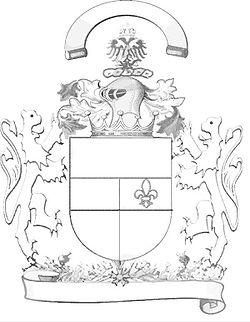- Motto
-
A motto (Italian for pledge, sentence; plural: mottos or mottoes)[1][2] is a phrase meant to formally summarize the general motivation or intention of a social group or organization. A motto may be in any language, but Latin is the most used. The local language is usual in the mottoes of governments. In informal ways, it can be a rule or slogan someone follows, or lives their life by.
Contents
Heraldry
In heraldry, a motto is often depicted on a scroll in an achievement of arms, typically below the shield or else above the crest as in Scots heraldry.
In English heraldry mottoes are not granted with armorial bearings, and may be adopted and changed at will. In Scottish heraldry mottoes can only be changed by re-matriculation, with the Lord Lyon King of Arms.[3] Although very unusual and perhaps outside standard heraldic practice, there are some examples of the particular appearance of the motto scroll and letters thereon being blazoned.[4]
A canting motto is one that contains word play. For example, the motto of the Earl of Onslow is Festina lente, punningly interpreting on-slow (literally "make haste slowly").
The motto of the County of Somerset is in Anglo-Saxon; that of South Cambridgeshire in the English Fens is in Dutch.
Ships and submarines in the Royal Navy each have a badge and motto, as do units of the Royal Air Force.
Literature
In literature, a motto is a sentence, phrase, poem, or word prefixed to an essay, chapter, novel, or the like suggestive of its subject matter. It is a short, suggestive expression of a guiding principle for the written material that follows.
For example, Robert Louis Stevenson's Travels with a Donkey in the Cévennes uses mottos at the start of each section.
See also
- Epigram
- Hendiatris
- Inscription
- List of Latin phrases
- List of mottos
- Slogan
- Tagline
- United in diversity
- United we stand, divided we fall
Notes
- ^ "Motto". Merriam-Webster. http://www.merriam-webster.com/dictionary/motto. Retrieved 31 January 2011.
- ^ "Motto". Oxford University Press. http://oxforddictionaries.com/view/entry/m_en_gb0537100. Retrieved 31 January 2011.
- ^ Innes-Smith, Robert (1990). An Outline of Heraldry in England and Scotland. Pilgrim Press. pp. 14. ISBN 0-900594-82-9. "Mottoes are not necessarily hereditary and can be adopted and changed at will."
- ^ "USS Winston S. Churchill (DDG-81)". Archived from the original on 2007-10-10. http://web.archive.org/web/20071010031547/http://www.tioh.hqda.pentagon.mil/Navy/USSWinstonChurchill.htm. Retrieved 2007-10-23.
Categories:- Mottos
- Italian loanwords
Wikimedia Foundation. 2010.

